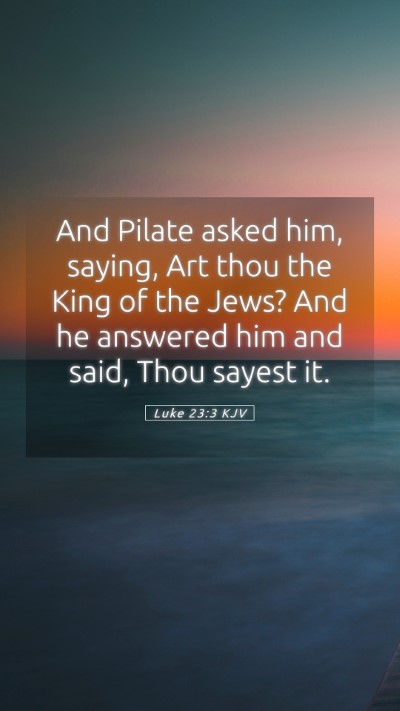Understanding Luke 23:3 - A Comprehensive Commentary
Luke 23:3 states: "And Pilate asked Him, saying, Art thou the King of the Jews? And He answered him and said, Thou sayest it." This brief but powerful exchange holds deep significance within its historical and theological context. In this analysis, we will explore various aspects of this verse, pulling insights from respected public domain commentaries to enhance our understanding of Scripture.
Overview of Luke 23:3
In this verse, Pontius Pilate, the Roman governor, questions Jesus about His identity and claims of kingship. Jesus' response is terse, affirming Pilate's statement while leaving much to interpretation. This encounter foreshadows the conflicting views of Jesus' nature as both king and servant, encapsulating the essence of His mission on Earth.
Key Themes and Interpretations
-
Authority and Jurisdiction:
Pilate's inquiry highlights the authority he holds as a Roman official. Jesus' reply not only acknowledges Pilate's question but also subtly challenges his understanding of kingship and authority. As Matthew Henry notes, "The question concerns the claims of Christ, and His answer reflects the nature of His kingdom, which is not of this world."
-
The Nature of Kingship:
The statement "Thou sayest it" invites deeper reflection. Albert Barnes points out that Jesus affirms Pilate’s assertion while allowing for a larger conversation about what it means to be a king. This presents a dichotomy that Pilate, and indeed many others, struggle to understand throughout the Gospel narratives.
-
Messianic Identity:
Adam Clarke emphasizes that this moment reflects the messianic expectations present at the time. By acknowledging His identity while facing condemnation, Jesus demonstrates the fulfillment of prophecy and His role in God's redemptive plan.
Historical Context
To grasp the full meaning of Luke 23:3, it’s essential to explore the historical context surrounding Jesus, Pilate, and Roman rule. During this time, the concept of kingship was politically charged, and Jesus' claim to kingship threatened the established order. This exchange further underscores the tension between earthly powers and divine authority.
The Role of Pilate
Pilate's character as a representative of Roman law introduces themes of justice and authority. His inquiry is not merely procedural; it represents a moment of true confrontation with Jesus' identity. As noted by Matthew Henry, "Pilate's question reveals a man's curiosity, but it also unveils his moral ambiguity."
Applications for Modern Readers
The dialogue in Luke 23:3 challenges modern readers to consider how they perceive authority, identity, and the nature of kingship. In relationships, society, and personal faith, the question of "Who is Jesus?" remains relevant and profound.
Personal Reflection
Believers are encouraged to reflect on Jesus' identity in their lives. The sincerity of Jesus' response invites individuals to explore their beliefs and the implications of acknowledging Jesus as King.
Related Scripture References
- John 18:37 - "Jesus answered, Thou sayest that I am a king." This verse echoes the sentiments found in Luke 23:3, revealing the continuity of Jesus' confrontation with earthly authority.
- Matthew 27:11 - "And Jesus stood before the governor: and the governor asked him, saying, Art thou the King of the Jews?" This parallel further illustrates the gravity of the moment.
- Isaiah 9:6 - "For unto us a child is born... and the government shall be upon his shoulder." This Old Testament prophecy amplifies the significance of Jesus' kingship.
Conclusion
Luke 23:3 serves as a poignant reminder of the intersection between heavenly authority and earthly power. The commentary provided by Matthew Henry, Albert Barnes, and Adam Clarke enriches our understanding of this pivotal moment in the Passion narrative. As we study this verse, we are encouraged to deepen our Bible study insights, exploring the intricacies of Jesus' identity and teachings.


